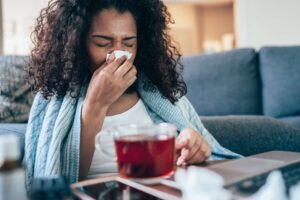Why You Really Get Sick in Winter

Why You Really Get Sick in Winter: The Chilling Truth Behind Seasonal Illnesses– As temperatures drop and the days grow shorter, many people start to notice a familiar pattern—runny noses, sore throats, lingering coughs, and trips to the pharmacy. It’s almost like clockwork. But why does winter seem to bring a tidal wave of sickness with it? Is it just the cold air? Or is there more going on behind the scenes?
Let’s dive into the science behind why people really get sick more often in the winter—and what you can do to protect yourself.
1. Cold Weather Weakens Immune Defenses
One of the biggest reasons we get sick more often in the winter has to do with how our bodies respond to cold weather. When temperatures drop, blood vessels in the nose and respiratory tract constrict. This limits the number of white blood cells that can reach the surface of the nose and throat—our body’s first line of defense against viruses.
Recent studies have also shown that exposure to cold air can reduce the effectiveness of the immune system at a cellular level, making it easier for viruses like the common cold and flu to take hold.
2. Viruses Thrive in Dry, Cold Air
Winter air is not just colder—it’s also drier. Low humidity allows airborne viruses to survive longer and travel further. Flu viruses, in particular, are more stable and stay infectious longer in cold, dry conditions.
This means you’re more likely to come into contact with an active virus just by breathing the same air as an infected person indoors.
3. More Time Indoors = More Exposure
When it’s freezing outside, people naturally spend more time indoors. That leads to closer contact with others in homes, offices, schools, and public transportation—perfect environments for viruses to spread.

Closed windows and reduced ventilation also allow viruses to accumulate in the air and on surfaces, making transmission even easier.
4. Lack of Sunlight and Vitamin D Deficiency
Winter months mean less exposure to sunlight, which leads to lower levels of vitamin D in the body. Vitamin D plays a vital role in regulating the immune system. When levels dip, your body becomes less efficient at fighting off infections.
In fact, research has linked vitamin D deficiency to increased susceptibility to respiratory infections during the colder months.
5. Seasonal Stress and Holiday Burnout
Let’s not forget the added emotional toll winter can bring. The holiday season—while joyful—also brings stress, travel, poor sleep, and dietary changes. All of these factors can weaken the immune system and make your body more vulnerable to illness.
Combine that with post-holiday burnout and New Year fatigue, and your body’s defenses may be lower than ever.
 3
3
How to Stay Healthy This Winter
The good news? There are practical steps you can take to reduce your chances of getting sick:
- Boost your immunity with a diet rich in fruits, vegetables, and whole grains.
- Stay hydrated to keep mucous membranes moist and more resistant to infection.
- Get vaccinated, especially for flu and COVID-19.
- Wash your hands regularly and avoid touching your face.
- Use a humidifier at home to keep indoor air at a healthy humidity level.
- Stay active and get enough sleep to support your immune health.
- Supplement with vitamin D, especially if you’re not getting much sunlight.
Getting sick in winter isn’t just about cold air—it’s a complex mix of environmental, biological, and behavioral factors. By understanding the science behind it and taking preventative measures, you can improve your chances of staying healthy all season long.
So next time you feel a sniffle coming on when the frost hits, you’ll know exactly why—and what to do about it.
Read:Eating Fat Doesn’t Make You Fat—The Real Culprit Behind Weight Gain





